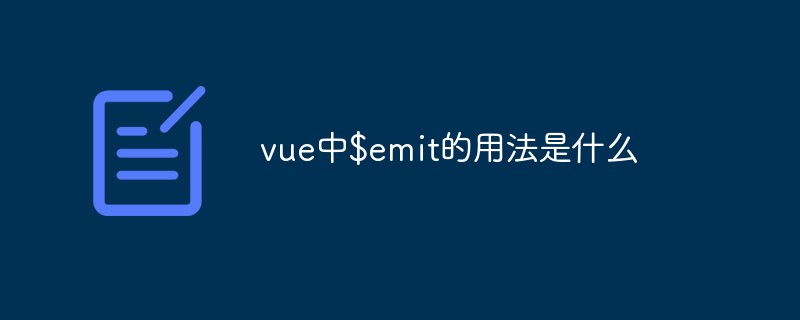What is the usage of $emit in vue
In vue, "$emit" is used to trigger events on the current instance, and nearby parameters will be passed to the listener callback; subcomponents can use "$emit" to trigger custom events of the parent component, and the syntax is: "vm.$emit( event, [...args] )".

The operating environment of this article: Windows 10 system, Vue version 2.9.6, DELL G3 computer.
What is the usage of $emit in vue
Use $emit(eventName) in vue to trigger events
$emit(eventName) triggers events on the current instance, with additional parameters will be passed to the listener callback.
Use $emit(eventName) to trigger events
Explanation in Api:
vm.$emit( event, […args] )
Usage of $emit in vue
1. The parent component can Use props to pass data to child components.
2. Subcomponents can use $emit to trigger custom events of parent components.
vm.$emit( event, arg ) //触发当前实例上的事件 vm.$on( event, fn );//监听event事件后运行 fn;
Examples are as follows:
Child component
<template>
<div class="train-city">
<h3>父组件传给子组件的toCity:{{sendData}}</h3>
<br/><button @click='select(`大连`)'>点击此处将‘大连’发射给父组件</button>
</div>
</template>
<script>
export default {
name:'trainCity',
props:['sendData'], // 用来接收父组件传给子组件的数据
methods:{
select(val) {
let data = {
cityname: val
};
this.$emit('showCityName',data);//select事件触发后,自动触发showCityName事件
}
}
}
</script>Parent component:
<template>
<div>父组件的toCity{{toCity}}</div>
<train-city @showCityName="updateCity" :sendData="toCity"></train-city>
<template>
<script>
import TrainCity from "./train-city";
export default {
name:'index',
components: {TrainCity},
data () {
return {
toCity:"北京"
}
},
methods:{
updateCity(data){//触发子组件城市选择-选择城市的事件
this.toCity = data.cityname;//改变了父组件的值
console.log('toCity:'+this.toCity)
}
}
}
</script>[Related recommendations: "vue.js tutorial 》】
The above is the detailed content of What is the usage of $emit in vue. For more information, please follow other related articles on the PHP Chinese website!

Hot AI Tools

Undresser.AI Undress
AI-powered app for creating realistic nude photos

AI Clothes Remover
Online AI tool for removing clothes from photos.

Undress AI Tool
Undress images for free

Clothoff.io
AI clothes remover

AI Hentai Generator
Generate AI Hentai for free.

Hot Article

Hot Tools

Notepad++7.3.1
Easy-to-use and free code editor

SublimeText3 Chinese version
Chinese version, very easy to use

Zend Studio 13.0.1
Powerful PHP integrated development environment

Dreamweaver CS6
Visual web development tools

SublimeText3 Mac version
God-level code editing software (SublimeText3)

Hot Topics
 How to use echarts in vue
May 09, 2024 pm 04:24 PM
How to use echarts in vue
May 09, 2024 pm 04:24 PM
Using ECharts in Vue makes it easy to add data visualization capabilities to your application. Specific steps include: installing ECharts and Vue ECharts packages, introducing ECharts, creating chart components, configuring options, using chart components, making charts responsive to Vue data, adding interactive features, and using advanced usage.
 The role of export default in vue
May 09, 2024 pm 06:48 PM
The role of export default in vue
May 09, 2024 pm 06:48 PM
Question: What is the role of export default in Vue? Detailed description: export default defines the default export of the component. When importing, components are automatically imported. Simplify the import process, improve clarity and prevent conflicts. Commonly used for exporting individual components, using both named and default exports, and registering global components.
 How to use map function in vue
May 09, 2024 pm 06:54 PM
How to use map function in vue
May 09, 2024 pm 06:54 PM
The Vue.js map function is a built-in higher-order function that creates a new array where each element is the transformed result of each element in the original array. The syntax is map(callbackFn), where callbackFn receives each element in the array as the first argument, optionally the index as the second argument, and returns a value. The map function does not change the original array.
 The role of onmounted in vue
May 09, 2024 pm 02:51 PM
The role of onmounted in vue
May 09, 2024 pm 02:51 PM
onMounted is a component mounting life cycle hook in Vue. Its function is to perform initialization operations after the component is mounted to the DOM, such as obtaining references to DOM elements, setting data, sending HTTP requests, registering event listeners, etc. It is only called once when the component is mounted. If you need to perform operations after the component is updated or before it is destroyed, you can use other lifecycle hooks.
 What are hooks in vue
May 09, 2024 pm 06:33 PM
What are hooks in vue
May 09, 2024 pm 06:33 PM
Vue hooks are callback functions that perform actions on specific events or lifecycle stages. They include life cycle hooks (such as beforeCreate, mounted, beforeDestroy), event handling hooks (such as click, input, keydown) and custom hooks. Hooks enhance component control, respond to component life cycles, handle user interactions and improve component reusability. To use hooks, just define the hook function, execute the logic and return an optional value.
 What scenarios can event modifiers in vue be used for?
May 09, 2024 pm 02:33 PM
What scenarios can event modifiers in vue be used for?
May 09, 2024 pm 02:33 PM
Vue.js event modifiers are used to add specific behaviors, including: preventing default behavior (.prevent) stopping event bubbling (.stop) one-time event (.once) capturing event (.capture) passive event listening (.passive) Adaptive modifier (.self)Key modifier (.key)
 Onmounted in vue corresponds to which life cycle of react
May 09, 2024 pm 01:42 PM
Onmounted in vue corresponds to which life cycle of react
May 09, 2024 pm 01:42 PM
onMounted in Vue corresponds to the useEffect lifecycle method in React, with an empty dependency array [], executed immediately after the component is mounted to the DOM.
 Promise usage in vue
May 09, 2024 pm 03:27 PM
Promise usage in vue
May 09, 2024 pm 03:27 PM
Promise can be used to handle asynchronous operations in Vue.js. The steps include: creating a Promise object, performing an asynchronous operation and calling resolve or reject based on the result, and processing the Promise result (use .then() to handle success, .catch() to handle errors) . Advantages of Promises include readability, ease of debugging, and composability.






